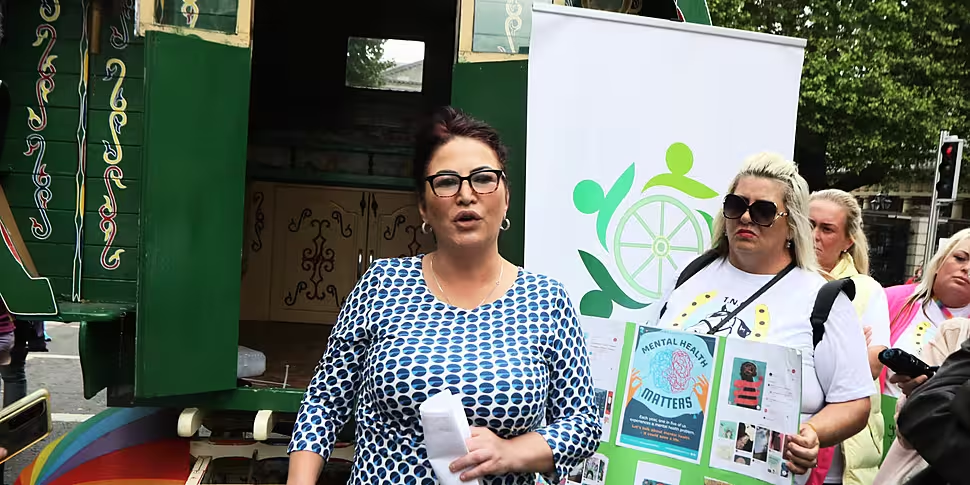It was January 2nd when Mags Casey’s life changed forever.
Early on a Saturday morning, her phone flashed up with her son’s name.
Thinking nothing of it, she picked up the call and heard the devastating words that every relative dreads.
“Mommy, Sue Ellen’s dead.”
“What do you mean dead?” she replied shocked.
“She’s dead, she’s dead. Come to the hospital, come fast.”
Ms Casey jumped in her car and sped away. Her sister-in-law Sue Ellen was only 29-years-old and she had four young children.
She was also the great love of Mags' brother John’s life. Friends often compared their marriage to something out of a Hollywood film, it was so loving and caring.
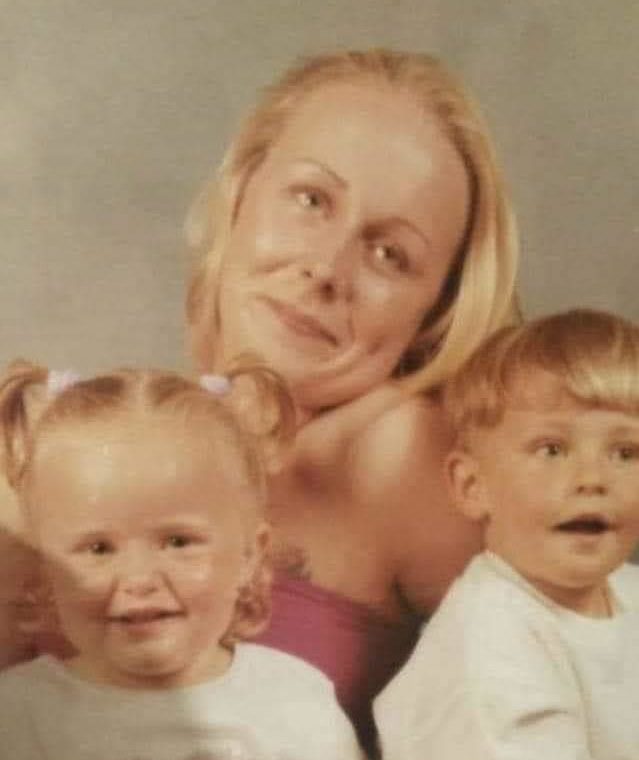 Sue Ellen
Sue EllenAfter she arrived at the hospital, Ms Casey was ushered into the mortuary where she found a scene of heart-wrenching grief.
Sue Ellen’s two-year-old son was pleading, “Mommy, please wake up” and John had his arms around his late wife, begging her to come back to life.
'A shadow of ourselves'
The funeral was a sombre occasion; Ms Casey recalls how the weeping of John and the children “hit the walls of the church”.
Afterwards the family were at a loss as to how they could help John but they knew he would need their help more than ever in the months and years ahead.
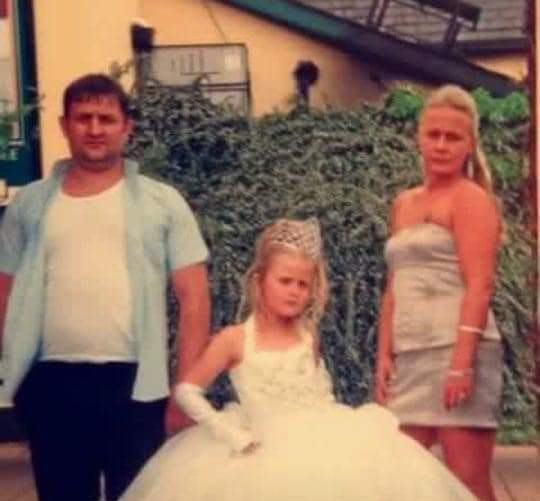 John and Suellen.
John and Suellen.“We lived in a shadow of ourselves at that time but we kept strong so that we could keep him going and support him to rear the kids,” Ms Casey told The Pat Kenny Show.
“He was our favourite boy, John was born on Christmas morning and John was born as a King, like Jesus to us.”
Two-years after the death of his wife, John took his own life as well. The burden of grief was too much for him.
Three-years later, Ms Casey’s other brother died by suicide as well - his mental health had been poor ever since the death of John.
In total, 29 members of her family have taken their own lives.
'It became the norm'
“It just became a vicious cycle, it became the norm after that,” Ms Casey said.
“We spent so much time in graveyards burying people, the graveyard actually became a playground for our children and ourselves… Then one day, I asked myself at the grave[yard], my little cousin was only 11-years-of-age and she [had just] died through suicide and I had to dig deep and find out what’s going on here.
“Why are so many of my people dying through suicide?”
One-in-ten
Sadly, the Casey family’s story is far from unique.
The CSO recorded 11 deaths by suicide per 100,000 people in Ireland in 2019; however, suicide is significantly more common among Travellers.
According to the All Ireland Traveller Health Study in 2010, just over one-in-ten, or 11%, of all Traveller deaths are the result of suicide.
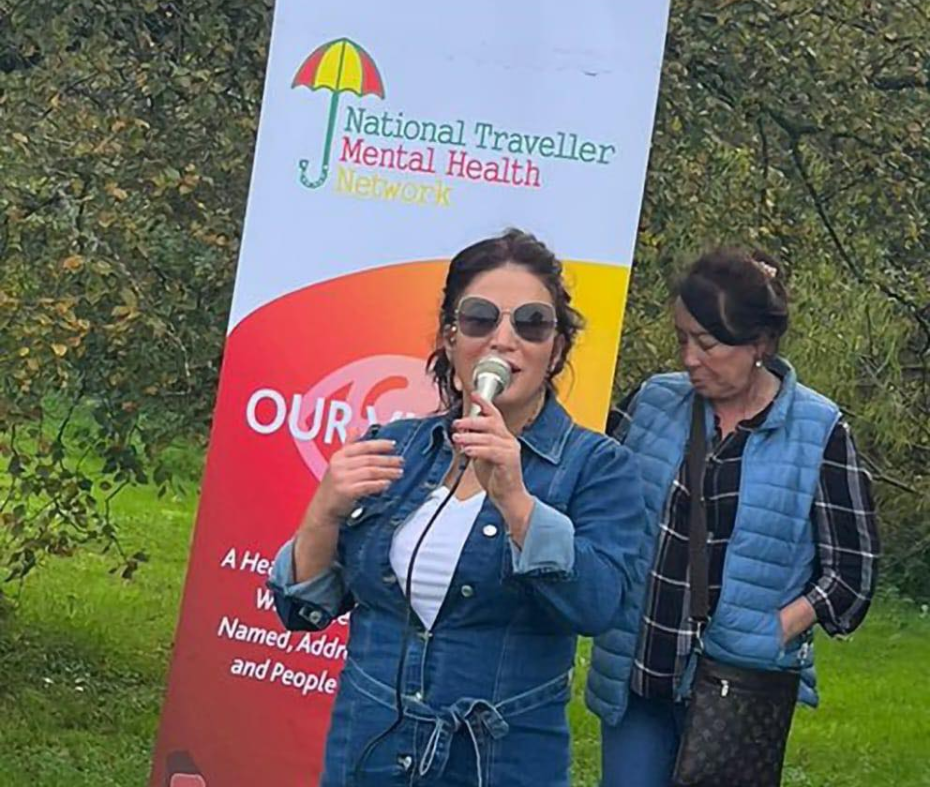 Mags Casey.
Mags Casey.Those figures are over a decade old but no research on the topic has been carried out since and the figure has been cited in the Oireachtas as recently as July last year.
If anything, many in the community feel things are worse than they were 13-years ago.
But why? Talking to Travellers, there are a number of factors that they cite again and again to explain why mental health in their community is so poor.
Anti-Traveller discrimination
Firstly, racism and discrimination against Travellers remains rife in wider Irish society.
A poll carried out by IPSOS for the Department of Children, Equality, Disability, Integration and Youth earlier this year found only 53% would feel very comfortable living next to a Traveller.
The same poll found that 96% would feel comfortable with a white Irish person as a neighbour and 95% would be comfortable if their child was in a relationship with a white Irish person.
Just 43% said they would be happy to see their child date a Traveller.
“Society tells you that you're a savage, that you’re a third-class citizen - basically you’re an animal and we treat you like an animal,” Ms Casey said.
“That’s what settled people have done to us; they’ve treated us like animals and savages and that hurts, that really hurts.
“That’s been a huge contributing factor towards mental health [problems] and suicide in Irish society.”
'There were no jobs going'
One of the starkest examples of Traveller disadvantage in comparison to the settled population is employment.
In the 2016 census, 80.2% of Travellers said they were unemployed and many have stories of being turned down for work as soon as employers learn of their ethnic background.
As a teenager, Senator Eileen Flynn was encouraged by the manager of a local nursing home to apply for a job, but as soon as they learned she was a Traveller, the home told her they were no longer hiring.
“As soon as I put in the CV with my address [listed as a halting site]… straight away there were no jobs going,” she said.
“That all has an impact on your mental health and your wellbeing.”
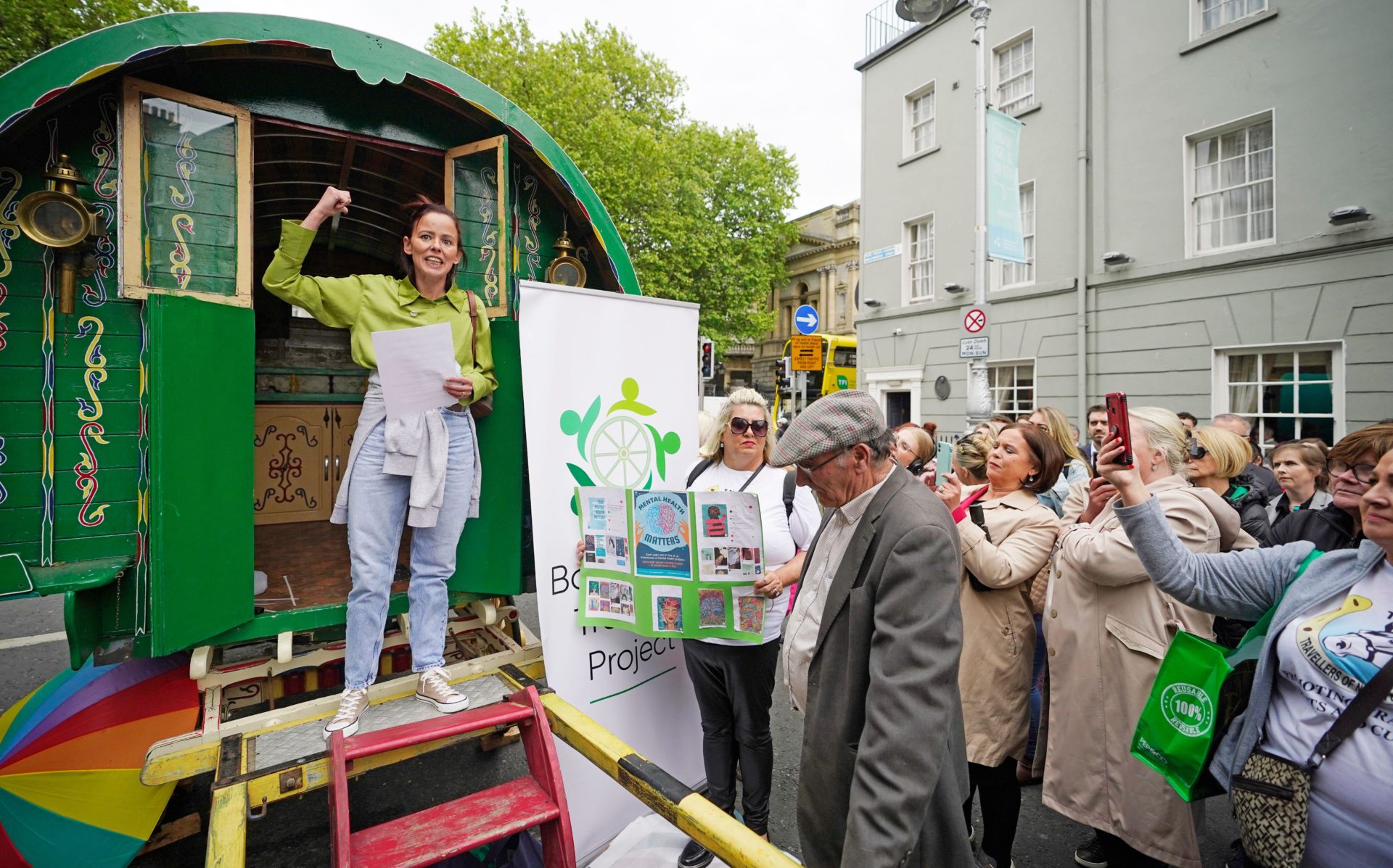 Senator Eileen Flynn addresses members of the Traveller community holding a protest outside Leinster House calling on the Taoiseach to address what they say is a denial of their human rights. Picture date: Tuesday May 31, 2022.
Senator Eileen Flynn addresses members of the Traveller community holding a protest outside Leinster House calling on the Taoiseach to address what they say is a denial of their human rights. Picture date: Tuesday May 31, 2022.When combined with poverty, poor quality housing and a pervasive lack of respect for their culture, Senator Flynn said the experience of being a Traveller “can be absolutely draining”.
Following the birth of her first child, she said she suffered from postnatal depression and the darkest of thoughts crept into her head.
“When Billie was six weeks old, I almost died by suicide,” she said.
“I was on the verge of it… and I’m very lucky to be here after I had her and that was my only attempt at suicide.
“My child was six-weeks-old; I didn’t feel good enough for her, I didn’t feel I’d ever be a good enough person for my little girl.
“I was thinking, ‘Why did I bring her into this world? A world of torture, if you want, because of who she is.’
“My child is both full-settled and she’s a full Traveller, I don’t believe that a person can be half of anything. All this is going through my head.”
State apology
In 2013, then-Taoiseach Enda Kenny offered an apology to survivors of the Magdalene laundries, acknowledging the pain and suffering they experienced because of the State’s intolerance of unwed mothers.
Five-years later, Leo Varadkar offered another apology, this time to Ireland’s gay citizens and Senator Flynn believes it is time one is offered to the Traveller community.
She also wants those in power to push back against the racism Travellers experience from members of the settled community and to stop pandering to it during elections.
“That kind of politics, being elected on the back of anti-Traveller [sentiment] is very real still today within Irish society,” she said.
“So, when we talk about the mental health crisis within our community, I genuinely believe it’s all the fault of the Irish State.
“It’s been successive Governments and this Government is not really looking to change [that].”
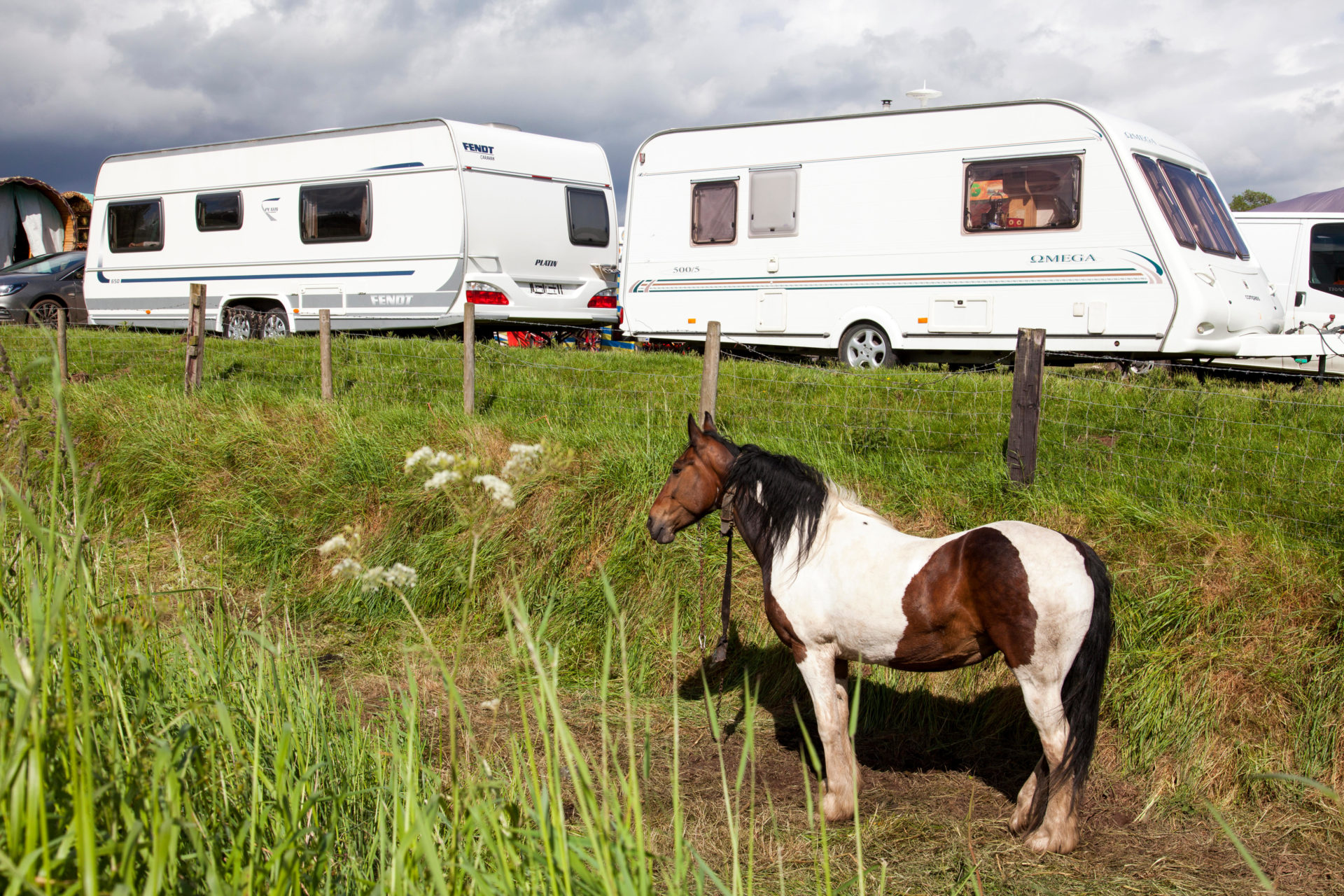 A Traveller camp.
A Traveller camp.The 2020 Programme for Government promised a Traveller and Roma Mental Health Action Plan and the HSE has since allocated €460,000 to seven projects as part of its Traveller Mental Health Initiative.
It is, Senator Flynn believes, a start but overall, she believes the Government has done “very little” given the severity of the mental health issues within the Traveller community.
“The answers are there,” she said.
“The solutions are there but what we’re missing bitterly in this country, for our community, is implementation.”
‘You make no wonder of it anymore’
At Dublin’s Pavee Point Traveller and Roma Centre, suicide is a familiar topic for mental health worker Patrick Reilly.
Indeed, it is so common a cause of death among his peer group, it has almost become ordinary.
“I have been impacted by suicide… and what struck me at a particular funeral I was at, a person said to me, ‘When you hear of a suicide in our community, you make no wonder of it anymore; it’s that common,’” he said.
“It’s tough on everyone because what tends to happen and can happen is you’re overwhelmed with grief.
“Why? How? There’s more questions than there are answers and as time goes on, you learn to cope with it but you’ll never forget.”
Mind Your Nuck
For staff at Pavee Point, part of the job is to step in and fill in the gaps left by the HSE and other State agencies that provide few Traveller-specific resources.
Last year, the centre launched a new website Mind Your Nuck - which in the ‘Cant’ Traveller language means ‘Mind Your Mind’ - to provide young Travellers with information about mental health in a culturally appropriate way.
“What was coming up was, when you go to look for mental health information online, it’s very text heavy,” Mr Reilly said.
“The words are very big. One guy said to me, ‘Pa, I don’t know what ‘overwhelmed’ means. I’m fed up. I’m fed up staying around the [halting] site all day with no job.’
“So, it was the language that [we changed]... and we put all those resources online.”
Even when Travellers do seek out help from doctors, many have told Mr Reilly they encounter indifference towards them and their problems.
“GPs are not referring Travellers on to mental health professionals,” Mr Reilly said.
“Obviously, the GPs are feeling that they’re not in need of mental health supports but I can’t say why a GP is not referring them on.
“The evidence has shown that Travellers are not being referred on and yet they’re ending up in emergency departments at crisis stage.”
On one occasion, Mr Reilly accompanied a Traveller to an emergency department after they had tried to take their life and the doctor asked him, “What do you want me to do? I’m a medical doctor.”
“This guy had made an attempt on his life, he needed a referral to a mental health professional,” Mr Reilly said.
“They gave me a referral but that man told me afterwards, ‘Pa, if you weren’t there, I would have just gone home.’
“Where would he have ended up?”
'Behind the curb'
Consultant psychiatrist Dr Anne Doherty has often treated Traveller patients in the course of her work in Galway and Dublin - but admits medical professionals often lack the data and research to help them properly.
“I think we are, maybe, behind the curb when it comes to knowing how best to engage with people from a Traveller background and how to offer services that make sense to them and that they’re able to engage with,” she said.
“I don’t know what the answer is and having done some small amount of research in the area, it’s really hard to engage Travellers in mental health-based research.
“So, we don’t have the level of information that we’d like to have about them and they are a group that definitely need better information and better services.”
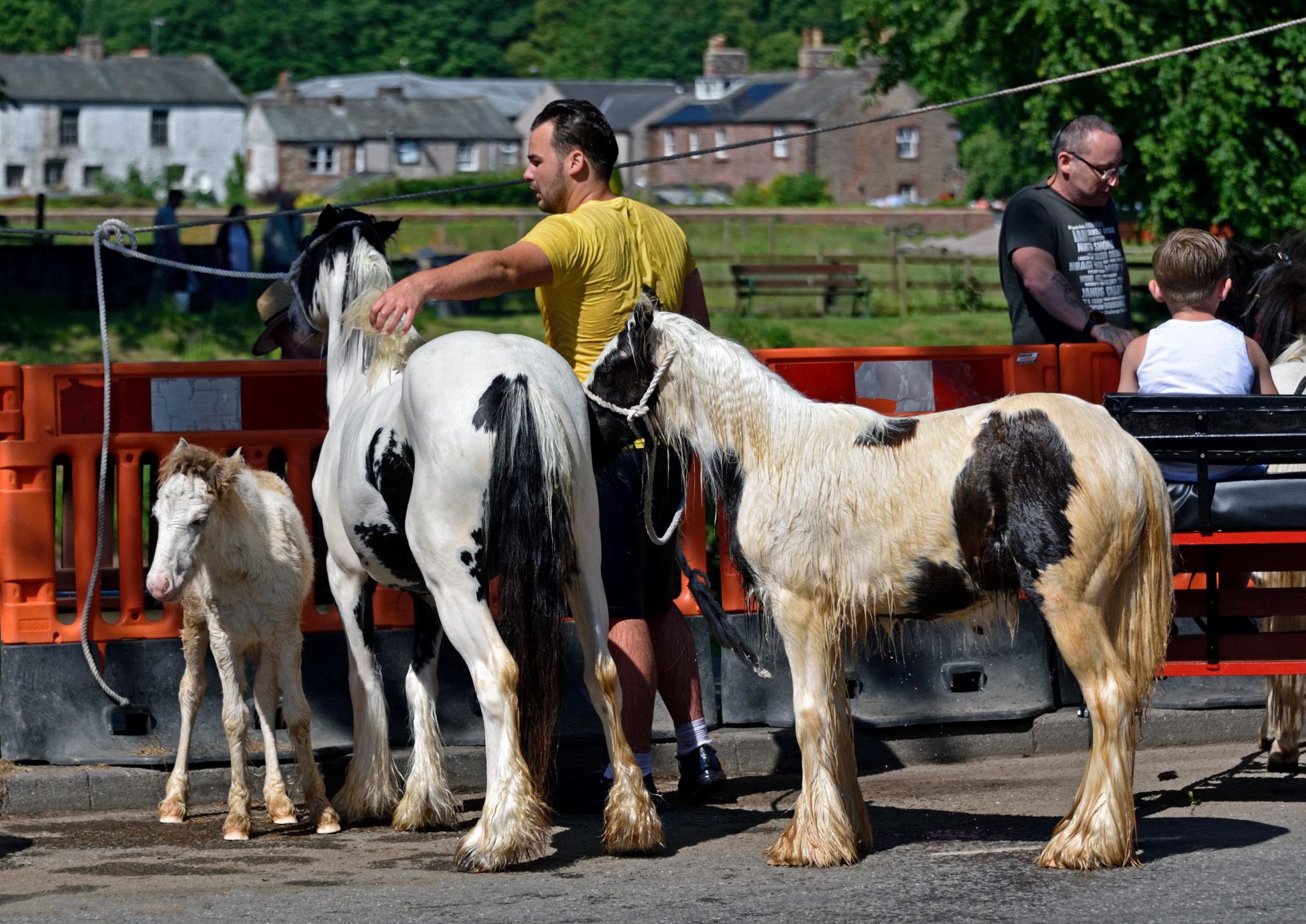 A Traveller with horses in June 2018. Picture by: Stan Pritchard / Alamy Stock Photo
A Traveller with horses in June 2018. Picture by: Stan Pritchard / Alamy Stock PhotoDespite a lack of research on the community, Dr Doherty does believe medical professionals do take Travellers seriously when they present with mental health difficulties.
“We probably take them more seriously if anything,” she said.
“Mainly because they present in the emergency setting significantly more unwell compared to the rest of the population… That’s just my perspective, obviously a Traveller might have a very different take on that.”
Traveller protest outside Dáil Éireann
On December 5th, Travellers from across Ireland will travel to Dublin to protest outside Leinster House demanding the political class address the problem of suicide within their community.
There are just under 33,000 Travellers in the Republic and Mags Casey is clear that change can only happen with help from the settled community.
“I think it’s really, really important to say to your listeners, please help us and support us to save our young children,” she said.
“To bury a young child and carry those coffins over and over and over again, please put yourselves in our shoes.
“Imagine bringing your 11-year-old child to the graveyard… Please help us.”
If you or someone you know is impacted by any of the issues discussed in this article, you can contact Samaritans 24 hours a day for confidential support on 116 123.
You can listen back here:
Main image: Mags Casey speaking standing on the steps of a wagan at the National Traveller Mental Health Network Protest outside Leinster House in Dublin.Photo:Leah Farrell/RollingNews.ie


